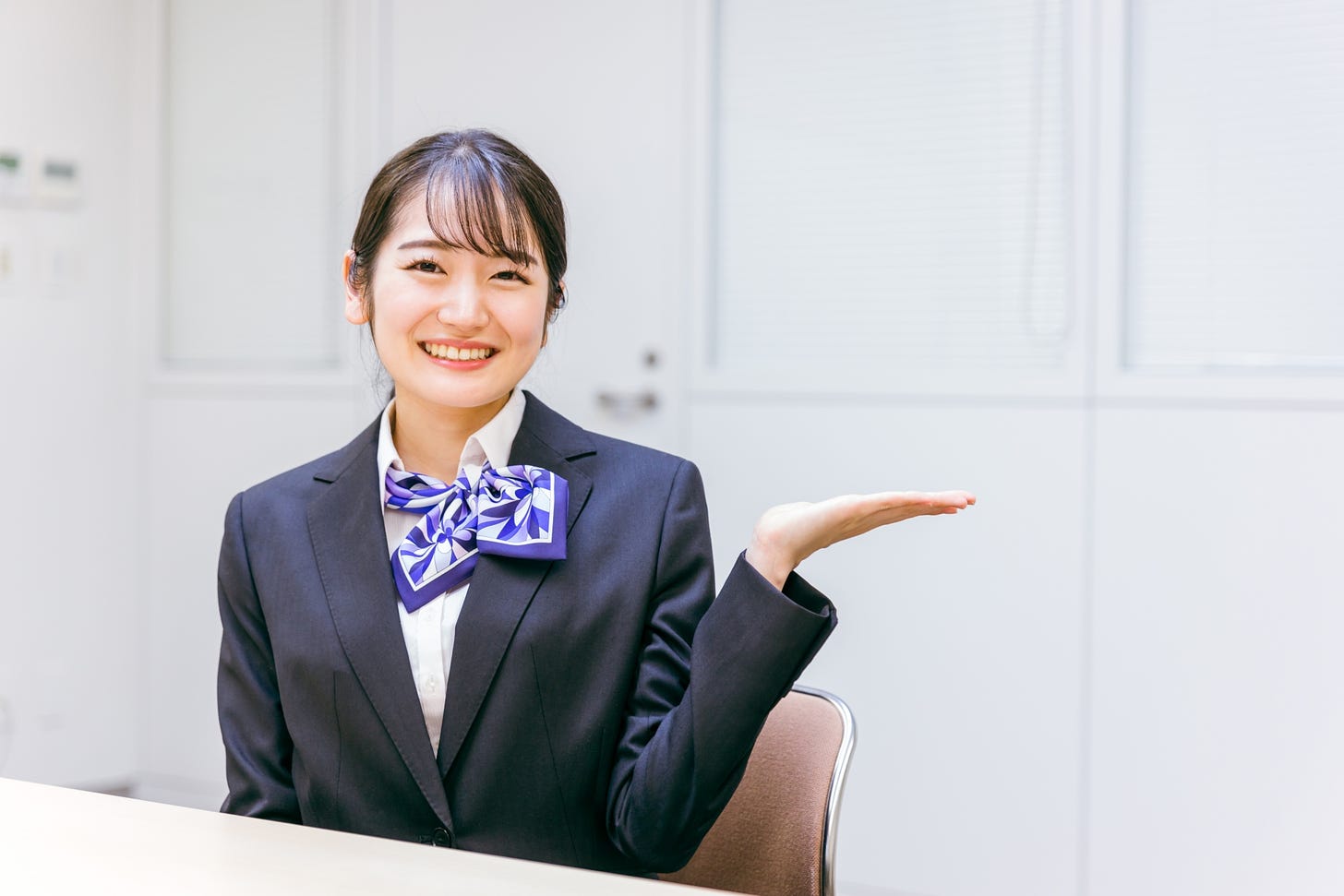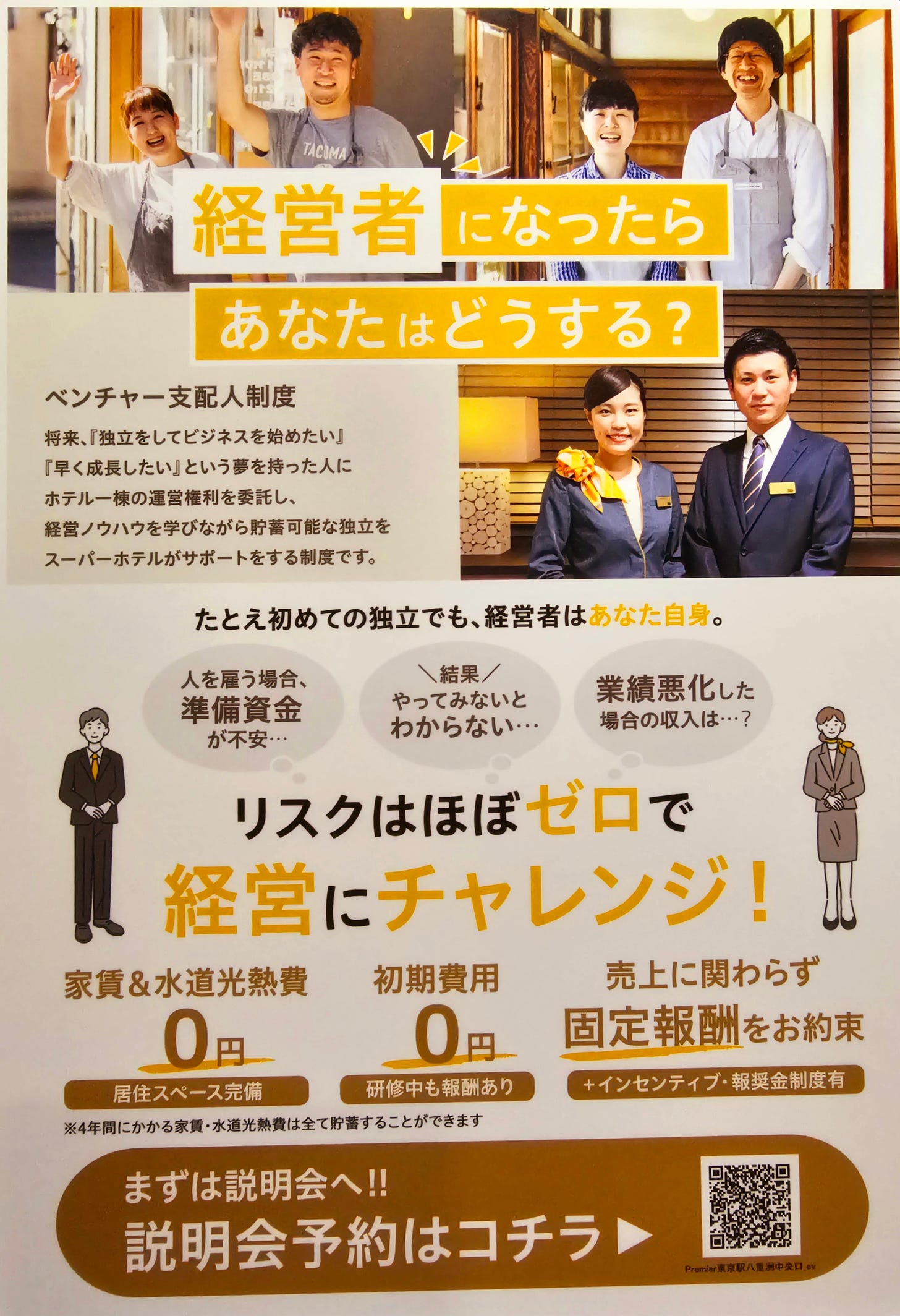

Discover more from Real Gaijin
Innovative "Venture Innkeeper Program" in Japan Seems Almost Too Good to Be True
The Super Hotel's "elevator pitch" presents an unusual business opportunity for would-be entrepreneurs with a relatively low tolerance for risk.

Listen to and/or watch the “Read My Lips Podcast Series” version.
What’s new: An innovative, new business model by Super Hotel of Japan for aspiring hotel innkeepers that is similar to a traditional franchise system but does not require any upfront funding or hotel management experience is providing young couples across Japan with an opportunity to become their own boss, gain valuable on-the-job experience managing hotel properties, and salt away plenty of earnings for the future.
Context: I routinely travel to Tokyo from my home on the southern main island of Japan about every 4 to 6 weeks, and I usually stay for about a week at a time. So I evaluate a good hotel based on geography, cleanliness, cost, and a few key amenities such as a "free" breakfast. I usually choose a single room, which in Japan can be as small as 12 square meters (about 130 square feet). I demand value for my money. Lately, I have been drawn to a chain called Super Hotel. Okay, I know what that sounds like to some of you. The aspirational name of this chain may conjure up images of one of those Japanese-style "love hotels" where you can pay by the hour. It is not that kind of place. For the most part, Super Hotel lives up to its name by offering the budget-conscious traveler a comfortable place to stay and most are within walking distance of major train or subway stations.
Disclaimer: I have no official affiliation with the Super Hotel chain, and this is not a paid article. The purpose is simply to share information.
How it works: About a year ago, while riding the elevator down from my room to breakfast, I noticed a curious poster on the wall that caught my attention, which was literally limited by the 30 or so seconds I had before the elevator reached the ground floor. A rough translation is as follows:
What would you do if you became a manager?
Venture Innkeeper Program
The Super Hotel supports those who dream of "starting their own business" and "growing quickly" in the future by entrusting them with the right to manage a single hotel, allowing them to learn management know-how and save money while becoming independent.
Even if it is your first time to start your own business, you will be put in charge.
(You may be concerned about the following, for example1)
How would I come up with funds to hire staff?
(What if I fail?) I won’t know if I can generate results until I try it.
Will I still get paid even if the performance is lacking?
Be challenged as a manager with almost no risk!
Rent & Utilities: 0 yen with a fully furnished living space
Initial Upfront Investment: 0 yen including compensation during training
Regardless of sales fixed remuneration is promised + an incentive reward system
All rent and utilities for 4 years can be saved!
Please come to the information session first! Click here to make an appointment to learn more.
Damn! Sign me up! ...but wait a minute! It seems too good to be true! What's the catch?
It actually took me a few more elevator rides to decipher the message (and before I simply took a photo of the poster), but it struck me as so unusual that I just had to follow the intended call to action at the bottom of the page and at least ask the innkeeper if this was for real.
Since the innkeeper and his wife were a little busy helping with the breakfast crowd, I decided to come back later in the day. I was amazed to learn their personal story and how the so-called "Venture Innkeeper Program" is, in fact, legit.

The innkeeper had previously been a "working stiff" like most people, toiling away at a dead-end job until one day he, too, had the opportunity to stay at a Super Hotel and, like me, noticed a similar poster on the elevator wall. Immediately attracted by the promise of living "rent-free" and the potential to become one's own boss without having to shell out a fortune to buy the rights to become a franchisee, the innkeeper signed up for an information session, and the rest is history. In just 5 years, he and his wife now manage 2 of these hotels and are currently considering a 3rd property. I had stumbled upon a budding hotel real estate empire in the making.
In exchange for agreeing to give it your best shot for at least 4 years, the Super Hotel guarantees an annual paycheck of about 11 million yen (about $75,000) and provides most of a floor of living space to new innkeepers of its chain of small hotels (typically 100 ~ 200 rooms). There is no upfront investment, which was a necessary requirement for the innkeeper of my hotel, as he and his wife had no savings when they first became innkeepers. This fact alone makes the offer very attractive.
Super Hotels provides basic classroom and on-the-job training to get their new innkeepers up to speed quickly, and they actively seek husband-and-wife teams—including Japanese citizens with a foreign-born spouse. This is not surprising given the recent influx of foreign visitors to Japan. An innkeeper with at least basic foreign language skills (usually English) has a built-in advantage. Innkeepers must manage their expenses (e.g., paying for staff to help manage the front desk, cleaning rooms, providing breakfast, implementing routine maintenance, etc.) out of the funds they receive as "salary.” Marketing campaigns and the reservation management system are handled by a centralized marketing and operations function. Thus, individual innkeepers do not have to worry about advertising and paying for such expenses. The innkeeper I interviewed explained that even after outsourcing certain functions, such as room cleaning and breakfast preparation, he and his wife have been able to net about 4 million yen ($27,000) after taxes each year. Thus, after 5 years that nest egg has grown substantially, especially since the couple simply lives in one of their hotels essentially "rent-free.”
While both husband and wife put in a significant amount of time behind the front desk, it is a labor of love for them, and they are able to rely on new innkeeper trainees to help with the long hours. I have found that at most Super Hotels, the staff—especially the innkeepers—are very friendly and seem highly motivated. It is likely that the Venture Innkeeper Program is the "secret sauce" responsible for channeling their motivation into outstanding customer service. I suspect that the Super Hotel enjoys a lot of repeat business from customers like me, which is likely given their high J.D. Power ratings.
The Super Hotel chain is certainly not a fly-by-night operation. It was founded in 1890 as a textile trading company in Osaka. The first Super Hotel brand hotel opened in 1996 in Fukuoka. There are now 173 locations, including an overseas hotel in Myanmar2. While the company took a hit during the Covid crisis, revenue growth is now back on track, with sales reaching 40.9 billion yen (approximately $276 million) in fiscal 2023.
Why it matters: If I were younger and just starting out, I would be seriously interested in this opportunity to be my own boss at such an early age with great earning potential. Especially in a country where starting salaries are relatively low and it seems unlikely that real wages will rise anytime soon, this kind of innovative, "in-between" path to becoming an entrepreneur would be an attractive proposition for an ambitious person who may be short on cash but willing to learn and put in the sweat equity necessary to make it work. Such opportunities seem to be few and far between in Japan.
What's next: The innkeeper explained that Super Hotels is expanding rapidly and is now beginning to branch out into developing a chain of retirement homes, which is already a booming industry in a country where nearly one in three people is now over the age of 65! Super Hotels is actively recruiting Generation Z, hoping to find qualified innkeepers with a long "runway." Would you be interested?
This particular business model, which is a kind of hybrid franchise system, could also be applied to other service industries—especially those with a chronic shortage of qualified providers. It certainly provides a lot of food for thought. What do you think?
#innkeeper #franchise #superhotel #VentureInnkeeperProgram #ベンチャー支配人制度 #スーパーホテル #フランチャイズ #支配人
Please note that you can subscribe to Real Gaijin for free. If you are so inclined, you can also purchase an annual subscription for a relatively small fee.
However, I understand that even the lowest level of annual subscription allowed by Substack may seem too high for many. If you just want to buy a coffee for Real Gaijin (or maybe a green tea), you can also make a small donation here:
https://buymeacoffee.com/realgaijin
All levels of support - including just liking a particular article and/or leaving a comment - are very welcome. Thanks again for reading.
While Real Gaijin lives in Substack, you can also find Real Gaijin on a few other platforms (listed in alphabetical order).
https://www.instagram.com/real_gaijin_on_substack/
https://www.threads.net/@real_gaijin_on_substack
https://www.tiktok.com/@real.gaijin
https://www.youtube.com/@RealGaijin
https://www.linkedin.com/in/mark-kennedy-5b50b71/
Editorial content added for context.
Current as of March 2023 (https://www.superhotel.co.jp/kaisya_r/company/summary.html)
Subscribe to Real Gaijin
Unveiling the Real Japan: An American Expat's Inside Look | Hot takes, commentary, and unfiltered insights on life as a foreigner in Japan.

























Reminds me of supers in NYC apartment buildings, who also live on-site rent-free and serve the residents and the building without a clear demarcation of worktime vs off-time, or provisions for overtime.
Very interesting. Total Energies in Uganda once had a similar model for operating their gas stations. They called it the "young dealer program". A young person with experience working on a gas station, would be given a gas station that is full stocked with gas, engines oils etc. The initial stock was a zero interest loan to the young dealer. The loan would be discounted from the operating profit of the gas station over several years.